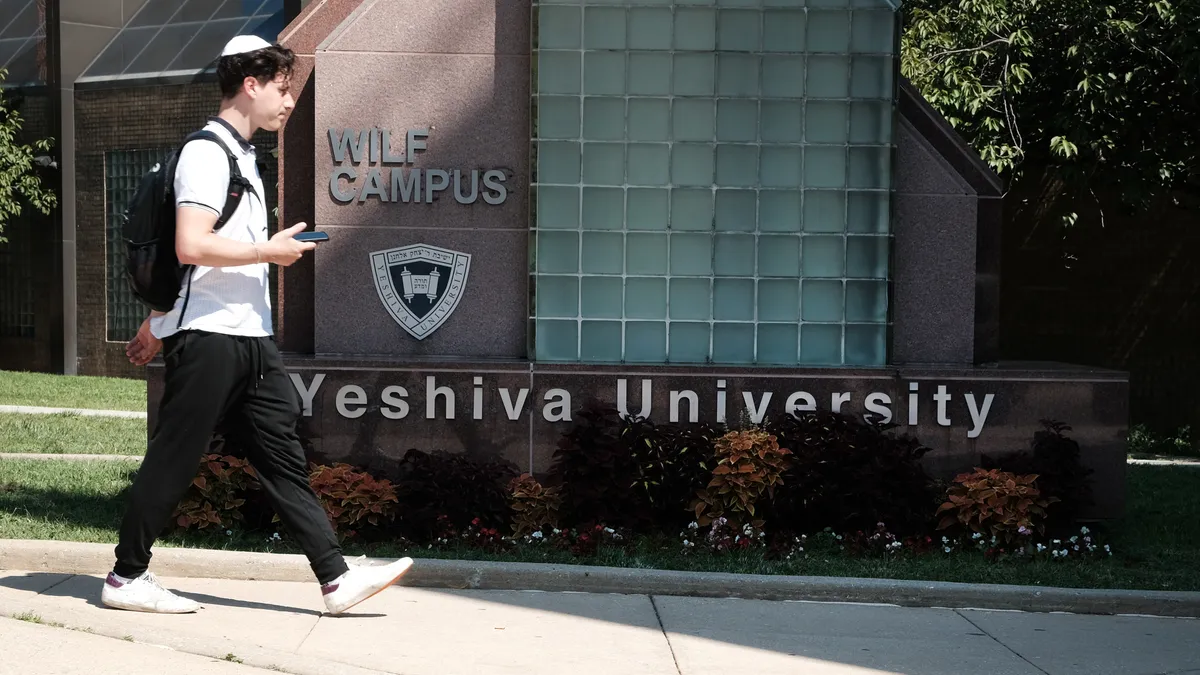Dive Brief:
- Yeshiva University will not be required to recognize an LGBTQ student club while it appeals a trial court's ruling in a case that pits New York City's human rights law against religious protections.
- A New York court ruled in June that the city's human rights law required the university to recognize the club, reasoning in part that the 5,500-student institution, historically affiliated with Orthodox Judaism, does not explicitly have a religious purpose under its organizing documents. Yeshiva appealed the decision within the state's court system, then asked the U.S. Supreme Court to take up the case quickly because the fall semester's club application process was slated to wrap up Monday.
- Justice Sonia Sotomayor on Friday blocked the New York court's order, meaning the university does not have to recognize the club at this time. Sotomayor addresses emergency appeals for a region including New York.
Dive Insight:
Friday's action comes as the Supreme Court is poised to issue major rulings on higher education. Justices are expected to decide this term whether race-conscious admissions policies at Harvard University and the University of North Carolina at Chapel Hill are constitutional.
Meanwhile, the court's conservative majority has been ruling in favor of religious interests. The court closed its last term with decisions saying Maine cannot refuse public voucher funding to schools simply because they are religious and that a school board in Washington state can't discipline a football coach for praying at midfield after games.
But the court has yet to engage with the substance at the heart of the Yeshiva case. Sotomayor only stayed a trial court injunction, meaning the order is temporarily blocked until the Supreme Court issues another order.
“The interim ruling is not a ruling on the merits," said Marc Stern, chief legal officer for the American Jewish Committee, in a statement. "Nevertheless, even a temporary stay would not have been issued if Justice Sotomayor believed the claim was frivolous or that some of her colleagues would think it was substantial."
Colleges and organizations connected to religious higher education sought to weigh in on the case. Among them are the Council for Christian Colleges and Universities, as well as a group that includes Biola University, Brigham Young University, Cedarville University, Houston Baptist University, Liberty University and Wheaton College.
"This case — which threatens to deprive religious schools of their ability to shape their communities according to their beliefs — is of enormous concern," the Council for Christian Colleges and Universities wrote in a request to file a brief.
Events in the case date back several years, when undergraduates at Yeshiva tried to form an LGBTQ student group for peer support and networking, according to court documents. Yeshiva wouldn't recognize the organization, called the Yeshiva University Pride Alliance or YU Pride Alliance, because it "would be inconsistent with its Torah values," the university said.
Three former students and a current student sued in 2021, alleging the university engaged in sexual orientation and gender discrimination. They sought damages and to force the university to recognize the YU Pride Alliance.
New York County Supreme Court Judge Lynn Kotler ruled in June that Yeshiva didn't count as a religious corporation under state law. Complying with the human rights law wouldn't infringe on the university's First Amendment rights because recognizing a group is not endorsing it, Kotler found.
The judge ordered the university to give the YU Pride Alliance the same treatment as other clubs.
Yeshiva appealed and asked higher state courts to block the order. It wasn't immediately successful, and it asked the U.S. Supreme Court to intervene Aug. 29 because of deadlines for fall club applications
Lawyers for the students replied that state courts have not finished reviewing the case. The Supreme Court would be jumping out of order by stepping in, they argued.
The students say the city's human rights law requires the university to grant the YU Pride Alliance the "same facilities and benefits" as 87 other student groups the university recognizes. Those benefits include holding meetings on campus, receiving funding and participating in listservs and student club fairs.
"While Yeshiva University can espouse its Torah values without interference, it may not deny certain students access to the non-religious resources it offers the entire student community on the basis of sexual orientation," they argued in court filings.
Yeshiva maintains it qualifies for a religious exemption under the law. It also says it examines all sponsored undergraduate activities to ensure they comply with its religious tenets. It has turned down other clubs, including some that would have involved gambling, video games and shooting, as well as a chapter of the Alpha Epsilon Pi fraternity.
But the plaintiffs said the university already has an LGBTQ club operating within its law school.















